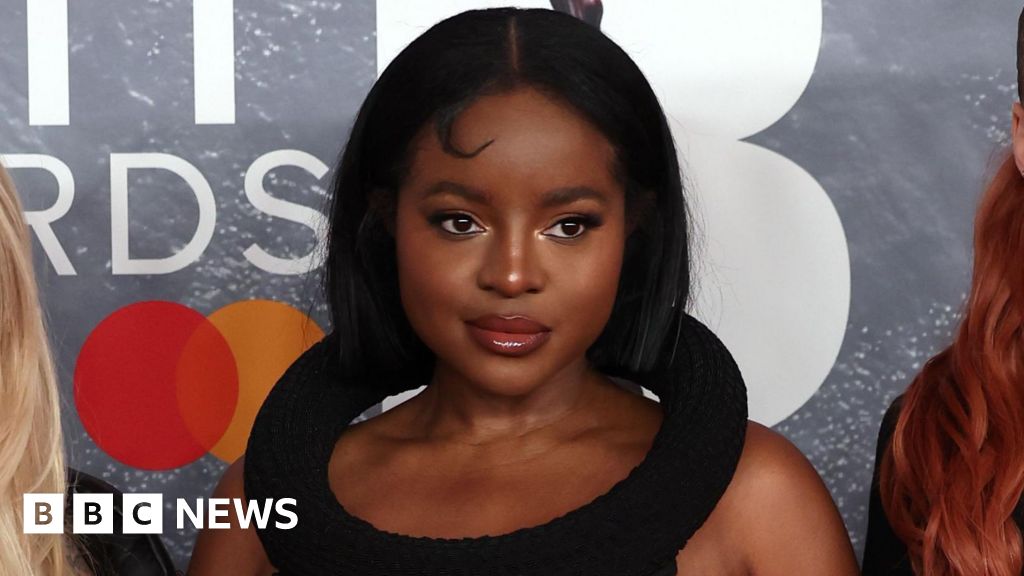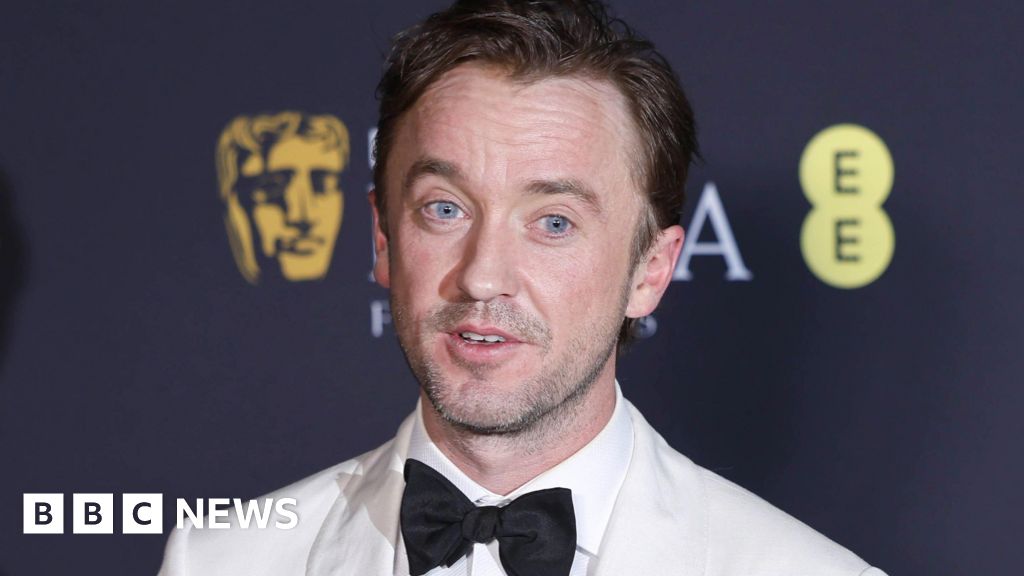ARTICLE AD BOX
By Ciaran McCauley
BBC News NI
Image source, Mark Junge
Image caption, Paddy Moloney (centre) with fellow Chieftains Sean Keane and Martin Fay performing at Cheyenne Civic Center in Cheyenne, Wyoming in 1988It's the group that, according to the Rolling Stones' Keith Richards, put Irish music "on the map".
With a career spanning six decades, the Chieftains remains one of the most influential and heralded music groups to emerge from Ireland - and all led by Paddy Moloney, the charismatic performer at the heart of the group, whose funeral takes place later following his death at the age of 83.
The group's musicians have collaborated with some of the world's biggest stars - from Mick Jagger to Sting, Dolly Parton and Luciano Pavarotti - and have sold out some of the most famous concert halls across the world, helping to bring traditional Irish music out of the pubs and backrooms of Ireland's towns and villages and to a global audience.
Here's a look back at the six-decade career of Moloney and the Chieftains, focusing on some of the achievements that went into building their legacy as one of Ireland's truly great musical exports.
The Chieftains were rock stars - kinda
In 1975, influential music publication Melody Maker ran its annual poll running down its best of the year, and there, claiming the honour of group of the year, was the Chieftains, beating the likes of Led Zeppelin, the Rolling Stones and Queen.
That's a folk group, who performed largely vocal-less Irish traditional music while sitting down and whose image was largely 'guys in the back corner of a pub', beating some of the biggest groups to ever plug in an amplifier.
This was the year the Chieftains really hit it big - their music was used in Stanley Kubrick's period drama Barry Lyndon. John Peel, the late BBC Radio 1 DJ, was a fan, having had the group on for several radio sessions.
And a sold-out show at the Royal Albert Hall convinced them to go full-time after more than a decade of performing and recording while juggling day jobs.
According to Moloney in 1988, the group could potentially have gone full-time sooner if it added Celtic rock elements, such as guitars and drums.
"But I wasn't interested because I had more respect for the sound, and for the music itself," he added.
Image source, Estate Of Keith Morris/Getty Images
Image caption, The Chieftains with 'Whispering' Bob Harris (centre left), presenter of BBC music programme The Old Grey Whistle TestWhen the group started out in the early 1960s, there would have been almost no chance of making a living as a folk or trad musician, with rock and roll and country and western dominating the Irish airwaves.
But Moloney's unique spin on the music - authentic but with newer arrangements, performed as a group - brought the Chieftains to critical acclaim, and popular notice eventually followed.
Paddy Moloney, founder of the traditional Irish music group, The Chieftains, has died at the age of 83.
In 1976, The Chieftains joined Humphrey Burton on Omnibus, where Paddy spoke about his famed Uilleann pipes and how the groups music had become so popular. pic.twitter.com/5EFHBR4DHP
The BBC is not responsible for the content of external sites.View original tweet on Twitter
They got their big break thanks in part to Guinness*
*Or, at least, an heir to the Guinness fortune.
In 1959, Garech Browne - whose mother Oonagh was the daughter of Ernest Guinness - founded Claddagh Records, in an effort to create a space where traditional Irish music could be conserved and revitalised.
The Chieftains were formed to make an album for the new label, with Moloney joined by Sean Potts, Michael Tubridy, Martin Fay and David Fallon.
That self-titled record was recorded in five evenings, Moloney told a BBC documentary in 2009, with the members working for three hours each night so they could get back to their day jobs.
But Browne's status would help the Chieftains take their next steps - Moloney would be introduced at the Guinness' heirs parties to some of the major stars of the day, helping to seed their influence.
Meanwhile, the Chieftains' leader was soon able to leave behind his ambition of becoming an accountant by becoming Claddagh Records' managing director.
The Chieftains, would of course, go on to give plenty of others a leg-up into the music industry, whether that be fellow Irish trad musicians and groups, or even the Lord of the Dance himself, Michael Flatley, who credits the group with giving him his big break when he toured with them from the early 80s.
They made history in China
Wham was famously the first pop group to perform in China following its opening up to the west in the 80s - but the Chieftains beat them there by two years, becoming the first western group to ever play at the Great Wall of China.
Moloney told Irish broadcaster RTÉ that the gig had emerged as a personal ambition after the Chinese Ambassador to England invited the band to the country after taking in a Chieftains gig at the Royal Albert Hall.
However, Moloney had to woo the Chinese to follow through - he told biographer John Glatt that he did so by inviting the Tianjin Ensemble of Chinese musicians and dancers to perform with the Chieftains in Dublin.
Image source, Gettys Images/James Fraher
His hosting led to a two-week jaunt in 1983, including concerts in Beijing, Suzhou, Shanghai and, of course, the Great Wall, where the band got through 10 minutes before a crush among the crowd started to become dangerous.
Bringing Irish music to the world was a theme for Paddy Moloney, who collaborated with musicians wherever he went. Elvis Costello, in his tribute this week, said Moloney "was tracing the connection of Irish traditional music and human kinship across the hemispheres".
"The Irish got everywhere and he had the musical evidence," he added.
US musician and songwriter Ry Cooder put it differently when he recalled a time they worked together with musicians in Havana.
"Every Cuban song we played him, he said it reminded him of an Irish tune. I swear Paddy thinks all the music in the world originally came from Ireland."
Their instruments have been out of this world
It was 2011 when the Chieftains, or at least a tin whistle and a flute owned by them, went on their most daring tour date yet - into space.
Cady Coleman, an astronaut based on the International Space Station (ISS), took a tin whistle belonging to Moloney and a flute owned by bandmate Matt Molloy up with her during a six-month jaunt in orbit.
A keen player and Irish music fan, the astronaut told the Irish Independent newspaper she met Paddy years previously via his son who was interning at Nasa.
I loved playing Paddy Moloney’s tin whistle on the ISS while floating/watching earth go by. Paddy had the rare ability to connect w/ people across the globe & I treasured our time together. My heart is w/ his family & musical family everywhere-he/his music will forever be missed. pic.twitter.com/BEfT6eV0xt
— Cady Coleman (@Astro_Cady) October 12, 2021The BBC is not responsible for the content of external sites.View original tweet on Twitter
Coleman also plays in Bandella, a rootsy-folk group comprised largely of former Nasa astronauts including Chris Hadfield, who famously performed Space Oddity while circling the Earth on the ISS.
The band performed with the Chieftains over the years, including in 2013 when Hadfield beamed in from the ISS to join the two groups - including Coleman - for a rendition of Van Morrison's Moondance.
They're the favourite musicians of your favourite musicians
Take a scan through the Chieftains discography and you'll see some serious names in the credits - Mick Jagger and the Rolling Stones; Sting; Sinead O'Connor; Tom Jones; Elvis Costello; Jackson Browne; Marianne Faithfull... and on and on and on.
They recorded entire albums with Van Morrison (Irish Heartbeat), flautist James Galway (Over the Sea to Skye: The Celtic Connection), Galician piper Carlos Núñez Muñoz (Santiago) and the best musicians Nashville and country music have to offer (Over The Old Plank Road).
But Moloney was also an in-demand session musician, lending his haunting work on the uilleann pipes to recordings by the Stones, Stevie Wonder and others.
It was in his capacity as a session player that Moloney found himself in a studio with Paul McCartney on the day John Lennon was murdered, having been contacted by McCartney to play on the track, Rainclouds.
In 2012, the Chieftains released its last studio album, Voice of Ages. True to form, it featured a slew of collaborators but this time younger, contemporary artists such as Bon Iver, The Decemberists and Irish singer-songwriter Imelda May.
After almost six decades, more than 40 records and countless live performances, the legacy of the Chieftains, and Paddy Moloney, is secure - they brought Irish music to a whole new audience, and created a musical juggernaut in the process.
An unlikely trajectory? Sure, but as Keith Richards said: "It's music that comes from the bones, to something that goes way, way back."

 3 years ago
97
3 years ago
97








 English (US) ·
English (US) ·